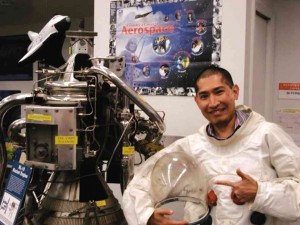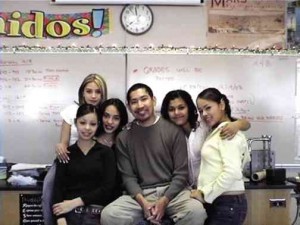Rodolfo Jensen Jr. was 4 when Neil Armstrong stepped on the moon.
Since then he has wanted to be an astronaut.
So he took up BS Physics in the country’s top university—University of the Philippines Diliman—and ran after his dream.
But his body stopped him. After college, he found out he had a congenital heart ailment which would not allow him to pursue a military career—a prerequisite to becoming an astronaut, he says.
But Jensen did not dive into depression, he instead went into teaching—first in UP Manila (Physics) for 12 years; then Math and Physics at University of Asia and the Pacific for two years.
The American Dream is always in the minds of many Filipinos, Jensen included. He worked on applying for a teaching profession in the US and ended up in Texas. He stayed in the US for five years.
In El Paso, Texas, non-Americans are always hounded by immigration issues as the place is near the Mexican border which is not a very peaceful place.
Jensen says there were less than 20 Filipino teachers in El Paso.

THE AMERICAN DREAM After Apollo 11 where Neil Armstrong became the first man to land on the moon, Jensen, then 4, already wanted to be an astronaut.
There were times when immigration officials would swoop down on the Filipinos. Although he was a legal alien, some of his students would offer them their mothers to marry off with him so he will stay.
“I went to the US in 2002 and when the green card dream didn’t materialize (2007) I tried my luck with international schools. Brazil took a chance with me.”
Jensen has gotten the way of dealing and taking care of teenagers—his students.
He says on the first day of class in the US, he asked each student to write down their traits on a piece of paper cut out in the shape of a T-shirt. He asked them to write various traits in each part of the shirt.
Then he lined them up in a corner of the room for all to see—like a laundry line.
“You get to know them and learn how each will act,” he says in an interview during his Christmas visit to his family.
After five years in the US, Jensen felt he did not get the American Dream and decided to look for other opportunities.
Jensen has been in Sao Paolo, Brazil, the past eight years, coming home at least once a year. The American School, his employer, provides for a round-trip ticket to his home country every year.
Jensen says he found other teaching opportunities but he chooses places with no snow.
“It has snowed in Sao Paolo only once,” he points out.
He knows that being alone during the winter season would be sad times thus he chooses tropical places as much as possible.
Jensen remains single—making sure he visits his mother and three sisters, living in Pasay City every year.
THE BEST OPTION After the green card dream did not materialize, he opts for The American School in Sao Paolo, Brazil.
In his 21-year teaching career, Jensen says students all over the world are basically the same:
“The needs of students (all over the world) are the same—they want to be taken seriously, they want to belong.”
When it comes to respect, Jensen points out that the ways students in the Philippines stand up when the teacher comes, or say prayers before and after class, really depend more on what they were taught to do.
He adds that when it comes to using mobile phones in the classroom, the kids (mostly 18 year olds) follow the rules set by the school or authority.
Jensen does not expect to retire in Brazil, he is open to other places (that have no snow). “It is expensive in Brazil.”
But for now he is enjoying his stay in the Latin American country.
He says he shops a lot and watches movies. At home his companion is his tabby cat.


